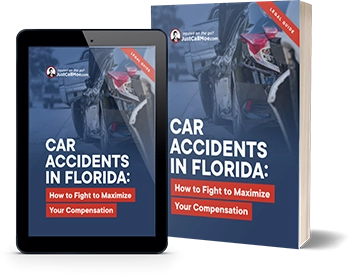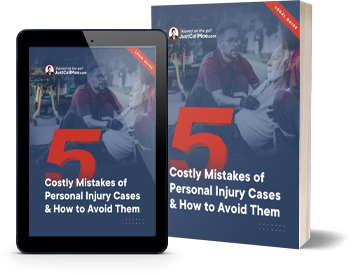In addition to injuries and property damage, one of the most stressful aspects of a motorcycle accident is proving who is at fault. Motorcycle accident fault statistics indicate that motorcyclists are more vulnerable than closed-vehicle drivers to crashes. It is important for motorcycle operators to be prepared ahead of time.
If you’re a motorcyclist, here’s an overview of how to prove fault in a motorcycle accident in Florida. If you have any questions or need assistance after an accident, contact our experienced Winter Haven motorcycle accident lawyers at JustCallMoe.
Understanding Motorcycle Accident Fault
Motorcycle accident fault is generally based on the concept of negligence, meaning one party failed to exercise reasonable care on the road. In Florida, this process involves several key factors:
Key Factors in Determining Fault
- Traffic Laws and Violations
- Examining whether any traffic laws were violated, such as speeding or running a red light
- Considering whether the motorcyclist or the other driver was cited for any violations at the scene
- Police Reports
- Reviewing the official police report for statements and observations from responding officers
- Using the report to identify any citations issued or notes on apparent fault
- Eyewitness Testimonies
- Collecting accounts from witnesses who saw the accident occur
- Corroborating witness statements to build a clearer picture of the events
- Accident Reconstruction
- Engaging experts to reconstruct the accident scene
- Using technology and expert analysis to determine how the accident happened
- Photographic Evidence
- Gathering photos of the accident scene and any visible damages
- Using photos to support claims about the cause and effect of the collision
- Medical Records
- Compiling medical reports that link injuries directly to the accident
- Demonstrating the severity and impact of the injuries sustained
Common Causes of Motorcycle Accidents
Understanding common causes of motorcycle accidents can help in proving fault.
Common Scenarios
- Left-Turn Accidents
- These often occur when a vehicle turns left in front of an oncoming motorcycle.
- Typically, the turning driver is found at fault for failing to yield the right of way.
- Lane Changes
- These happen when a vehicle changes lanes without noticing a motorcycle in the adjacent lane.
- The driver making the lane change is usually at fault.
- Rear-End Collisions
- These occur when a vehicle strikes a motorcycle from behind.
- Generally, the rear driver is held responsible for following too closely or not paying attention.
- Open-Door Accidents
- These involve a car door opening into the path of a motorcycle.
- The person opening the door is often at fault for not checking their surroundings.
- Speeding and Reckless Driving
- Speeding or aggressive driving by either party can contribute to accidents.
- The fault may be shared if both parties were acting negligently.
- Driving Under the Influence
- Accidents caused by impaired drivers often result in clear fault.
- The impaired driver is typically found at fault.
Gathering Evidence To Prove Fault
Evidence is key to proving fault. Here are some important steps to take when gathering evidence:
- Document the Scene
- Take detailed photos of the accident scene, vehicle damage, and any skid marks.
- Note the time, weather conditions, and road conditions.
- Obtain Witness Information
- Collect contact details and statements from any witnesses.
- Witnesses can provide valuable third-party perspectives.
- Request Police Reports
- Obtain a copy of the police report.
- Use the report to support your claims.
- Preserve Medical Records
- Keep detailed records of all medical treatments and diagnoses related to the accident.
- Medical records demonstrate the extent and cause of your injuries.
- Consult Experts
- Work with accident reconstruction experts to analyze the scene and vehicle damages.
- Experts can provide testimony to support your case.
- Maintain Communication Records
- Save all correspondence with insurance companies, medical providers, and witnesses.
- Documenting communications helps establish a timeline and supports your claims.
Florida’s Comparative Fault Rule
In Florida, the comparative fault rule can affect how compensation is awarded. Under this rule, fault can be shared between parties, and compensation is adjusted based on each party’s degree of fault. For example, if you are found to be 20% at fault for the accident, the compensation you can claim will be reduced by 20%.
Understanding Comparative Fault
- Partial Fault
- If both parties share fault, each party’s compensation is reduced by their percentage of fault.
- Greater Percentage of Fault
- If you are found to be more than 50% at fault in Florida, then you cannot recover compensation for damages.
- Insurance Implications
- Insurance companies will use the comparative fault rule to determine settlement amounts.
How JustCallMoe Can Help
At JustCallMoe, our attorneys are dedicated to helping you every step of the way if you’ve been in an accident. We will:
- Investigate Thoroughly
- Conduct a thorough investigation to gather all necessary evidence
- Use our network of experts to support your case
- Communicate with Insurance Companies
- Negotiate with insurance companies on your behalf to secure fair compensation
- Relieve you of the stress of dealing with insurers
- Provide Legal Guidance
- Offer clear and informed legal advice tailored to your specific situation
- Keep you informed throughout the legal process
- Advocate for You
- Represent your best interests in all legal proceedings
- Fight to ensure you receive the compensation you deserve
- Support Your Recovery
- Allow you to focus on healing while we handle the legal matters
- Provide compassionate and dedicated service every step of the way
- Ensure Fair Outcomes
- Strive for a fair resolution that acknowledges the full impact of your injuries and damages
- Work diligently to achieve the best possible outcome for your case
In addition, we don’t collect payment unless we win your case. Rather than collect upfront fees, our firm will receive a percentage of the judgment or settlement that you win.
Contact JustCallMoe for Help With Proving Motorcycle Accident Fault
If you’ve been involved in a motorcycle accident in Florida, proving a motorcycle accident fault is an important step toward securing the compensation you deserve. At JustCallMoe, our experienced attorneys are here to help you every step of the way. Injured on the go? JustCallMoe!

 (866) 225-5663
(866) 225-5663



